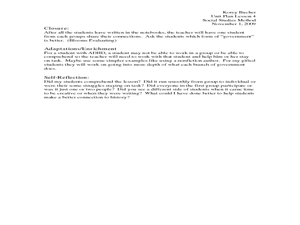School Improvement in Maryland
Types of Economic Systems
As an introduction to economics, government classes investigate different types of economic systems (traditional, command, market or capitalist, mixed) to determine answers to basic question about how goods are produced.
Curated OER
Who's The Boss?
Upper elementary and middle schoolers research and analyze some different types of governments. Democracies, Monarchies, and Dictatorships are some of the types that are looked at. Learners use the Internet to gather information that...
Curated OER
The Three Branches of Government
Students complete a unit on the three branches of government. They compare/contrast the three branches of government, write a letter or e-mail to an executive in the Federal Government, and develop outlines for historical documents.
Curated OER
Types of Branches
Fourth graders study the three branches of government. In this politics lesson, 4th graders list the three branches of government, understanding what each branch does, and compare and contrast how government is run with how the school is...
iCivics
Wanted: A Just Right Government
What type of government did American colonists gain and seek after gaining their independence after the Revolutionary War? Here is activity that will guide your young learners through the new nation's progression from the Articles of...
iCivics
Why Government?
Why do people create governments? Where did we get our ideas about government? This is a fantastic introductory lesson for your American government class that begins by reviewing the philosophies of Thomas Hobbes and John Locke in...
Curated OER
Government
Second graders run for various offices. They dress up like a politician, pretend to be running for an office, and tell the students why they should vote for him/her. They explain why it is necessary for a community to have a government
School Improvement in Maryland
Political Systems: Advantages and Disadvantages
Every political system has advantages and disadvantages. To gain an understanding of these differences, groups investigate the political system of another country—oligarchy, monarchy, dictatorship, parliamentary—and prepare a...
School Improvement in Maryland
Court Proceedings Civil Cases
What's the difference between civil and criminal law? How do the court proceedings differ in these two types of trials? How do the standards of proof differ? Why do these differences exist? As part of their examination of the US court...
Stanford University
Great Society
Students explore the Great Society. In this U.S. history and government instructional activity, students view the video "The Great Society," identify the major points of the speech, and compare and contrast the content with The New Deal.
Curated OER
Social Security
Students examine the official website for the Social Security Administration. They learn the history of the program and what it is supposed to do for Americans. They compare social security with other types of retirement accounts.
Curated OER
FROM STUDENT TO GLOBAL CITIZEN
Learners develop an awareness of citizenship and how it's defined globally. They explore the cultural diversity of different types of communities around the world. In addition, they assess the rights and responsibilities that are...
National Endowment for the Humanities
Revolution '67, Lesson 2: What Happened in July 1967? How Do We Know?
Even in a world in which dozens of participants and curious onlookers record every controversial event, the basic facts of what happened are often in dispute. Revolution '67, Lesson 2 explores 1967 Newark, New Jersey using an examination...
Curated OER
Donkeys and Elephants and Voters, Oh My!
Students celebrate party politics. In this American politics lesson, students discover what the 2 main political parties in the country are and discuss their functions. Students then participate in a classroom simulation that requires...
Curated OER
Natural Forces
Students assess the damage natural forces have caused Maryland's geographic features. In this state geography and ecology lesson, students work in a group to research ways in which weathering, erosion, and deposition have affected the...
















